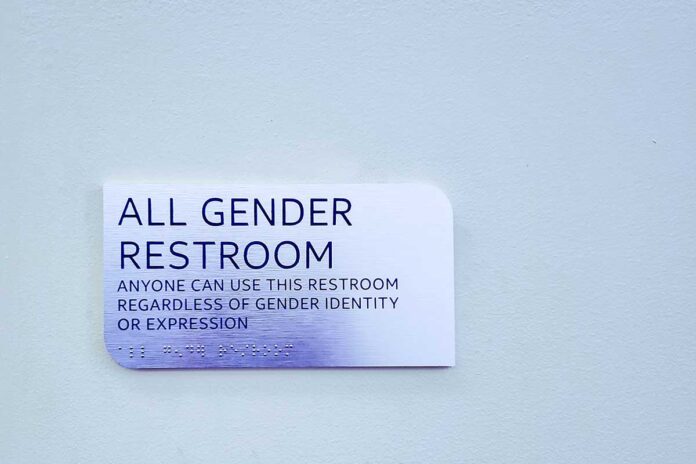On July 9, a federal judge blocked a Tennessee law that would require businesses and other public venues to post a warning sign if they allow trans people to use restrooms consistent with their gender identity.
The Tennessee law, known as HB 1182, was set to go into effect July 1. It required the following sign be posted outside trans-friendly, multiperson restrooms: “This facility maintains a policy of allowing the use of restrooms by either biological sex, regardless of the designation on the restroom.” Failure to post the sign could have resulted in a six-month jail term and a $500 fine.
On May 17, Tennessee Gov. Bill Lee signed HB 1182 into law.
On June 25, ACLU attorneys filed a lawsuit on behalf of Kye Sayers, owner of Sanctuary Performing Arts in Chattanooga, and Bob Bernstein, owner of Fido restaurant in Nashville. Both owners have trans-friendly restroom policies. They asked for a preliminary injunction to halt enforcement of the law — which also applies to locker rooms, showers and dressing rooms.
In a 31-page opinion, U.S. District Judge Aleta A. Trauger of the Middle District of Tennessee issued the preliminary injunction, which will remain in effect as the litigation proceeds.
“The state of Tennessee has enacted a law ordering plaintiffs to say something they do not wish to say in furtherance of a message they don’t agree with,” Trauger wrote. “Because the plaintiffs are likely to succeed on their challenge and because allowing the law to be enforced while this litigation proceeds would harm them irreparably, the court will grant a preliminary injunction against the law’s enforcement.”
Trauger also noted that “Restaurants and performing spaces are businesses, but that is not all they are. They are also among the most important physical locations in which communities — so often consigned, in this era, to electronic space — can gather and grow together in a manner rooted in a particular neighborhood, in a particular city, in a particular state. The plaintiffs have presented evidence that they have strived to be welcoming spaces for communities that include transgender individuals and that the signage required by the Act would disrupt the welcoming environments that they wish to provide. That harm would be real, and it is not a harm that could simply be remedied by some award at the end of litigation.”
Defendants include the Tennessee state fire marshal, the state codes enforcement director and two district attorneys. Their attorney had no comment for this story.
Opponents of the new law say it compels anti-trans speech and contributes to anti-trans violence and discrimination. Ultimately, they want the law declared unconstitutional.
The law’s sponsor, state Rep. Tim Rudd (R-Murfreesboro) couldn’t be reached for comment. In a prior statement, he defended the measure. “Whether you’re a man or woman, don’t you want to know who might be waiting on the other side of a bathroom door when you go in?” Rudd said in a statement. “Everyone has a reasonable expectation to the right of privacy and dignity when using the restroom.”
The ACLU of Tennessee blasted HB 1182. “This law is bad for businesses in Tennessee, and most importantly, harmful to transgender people,” said Hedy Weinberg, ACLU of Tennessee executive director. “We are glad the court saw that this law is likely unconstitutional and hope that the state gives up the wasteful effort to defend discrimination and a violation of the First Amendment.”
Sayers and Bernstein praised Trauger’s ruling.
“I am glad the court saw that forcing businesses to display a sign that hurts transgender and intersex people is [likely] unconstitutional,” said Sayers. “These signs would have damaged our businesses and the environment we have tried to create for our community, customers, and staff.”
Bernstein echoed those sentiments. “I’m happy that the court stopped this invasive and decisive legislation for now and am hopeful this leads to a permanent ban of an unconstitutional violation of my freedom of speech rights,” Bernstein said, in a statement.
Their 19-page lawsuit emphasizes the safety needs of trans individuals. It also states Sayers and Bernstein don’t wish to “police” their restrooms. Additionally, their lawsuit points out that trans-friendly restrooms don’t pose a safety risk. Moreover, the wording of the sign is offensive and could hurt plaintiffs’ business.
On June 30, a similar lawsuit was filed against the law by Mike Curb, a Nashville record label owner, who is represented by the National Center for Lesbian Rights; GLBTQ Legal Advocates and Defenders; and the law firms Sherrard Roe Voigt Harbison PLC and Rubenfeld Law Office PC.
“It’s outrageous to have the government come in and force me to send such a derogatory message to my employees and customers,” Curb said in a statement.
